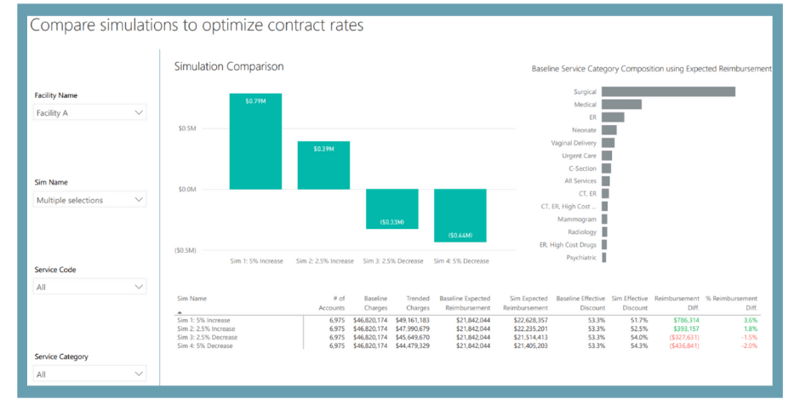.png)

Strengthening Hospital Leverage in Payor Discussions
Ensuring effective payor negotiations is critical for financial stability in healthcare. With reimbursement rates under constant scrutiny and healthcare costs continually rising, adopting actionable strategies to optimize payor contracts is not just beneficial—it’s essential.
In this first post of our three-part series, we’ll focus on three fundamental strategies that healthcare organizations can leverage to streamline negotiations:
- Utilizing advanced analytics for more informed decision-making
- Implementing contract modeling to anticipate financial outcomes
- Leveraging data visualization to identify trends and communicate effectively
Ready to make your negotiations more impactful? These strategies provide a strong foundation.
Leveraging Advanced Analytics for Smarter Negotiations
Why Advanced Analytics Matter
The healthcare financial landscape has become increasingly complex, making advanced analytics indispensable for hospital finance teams. Analytics empower CFO’s and their organizations to move beyond basic reimbursement evaluation, enabling them to deeply understand the nuances of payor terms and their financial implications.
Brian Kenyon, AVP of AI and Revenue Services, explains:
“Reviewing contract basics is easy—but the real value lies in advanced analytics that uncover the nuanced terms and provisions driving financial performance. Without leveraging these insights, organizations risk overlooking material impacts and settling for terms that erode profitability.”
Analytics address critical negotiation questions, such as:
- Are we accepting contracts below industry benchmarks?
- Which procedures of service lines drive the highest revenue streams?
- How does our reimbursement compare the regional and national averages?
How to Implement Advanced Analytics
To effectively deploy advanced analytics, ensure your hospital finance team has:
- Clean and Relevant Data
Accurate, up-to-date reimbursement rates, charges, and patient metrics form the basis for actionable insights. - Benchmarking Tools
Tools provided by partners like PMMC help benchmark contract terms , highlighting performance gaps and opportunities. - Predictive Modeling
Estimate the financial impact of proposed payor contracts. Brian notes:
“Analytics lets our clients clearly see how underpayments, denials, and rate shifts impact their financial health. They’re negotiating based on real-world data, not guesswork.”
Implementing Contract Modeling for Negotiation Success
The Importance of Contract Modeling
Contract modeling lets hospital finance teams simulate financial impacts of prospective payor agreements before signing.
Modeling helps teams address critical negotiation questions:
- Are reimbursement levels sustainable for heavily utilized service lines?
- Will shifting patient behavior under new terms alter revenue projections?
- Could proposed contract terms lead to underpayments?
Best Practices for Contract Modeling
To maximize the benefits of contract modeling:
- Leverage User-Friendly Software
PMMC’s solutions offer straightforward scenario analyses, allowing teams to efficiently collaborate. Within the tool, you can share data sets, build what-if scenarios, and more together. This allows your team to all have access and to work together and see all possibilities.
- Create Multiple Scenarios
Adjust variables like negotiated rates, service volumes, and seasonal factors to identify optimal contract terms. Customized reports allow your team to see different scenarios.
- Collaborate Across Departments
Engage clinical and operational leaders for comprehensive insights, creating holistic contract strategies that protect all service lines. Teams can work together and all have access to the same information. Collaboration also occurs on the output side, where reports provide insight for all clinical and operational leaders.
Integrating contract modeling provides hospitals a significant advantage in achieving favorable, sustainable payor agreements.
Enhancing Insights with Data Visualization
Why Data Visualization Is Crucial
Presenting complex financial data clearly is key for effective payor negotiations. Data visualization bridges the gap between raw data and meaningful insights, helping stakeholders:
- Quickly grasp trends and outliers
- Compare payor contract performance effectively
- Clearly communicate impacts to non-financial stakeholders
Data visualization transforms internal discussions, helping everyone quickly align on the best strategy. When finance teams clearly see visuals—like which contract proposals get them closest to revenue goals—it greatly simplifies decision-making.
Visualization in Action
Effective visualization has tangible impacts.
Visualization is often cited as a game-changer. For instance, teams running multiple negotiation scenarios individually often benefit immensely from seeing all models visually side-by-side. It unifies their decision-making process, leading to stronger negotiation outcomes.
Effective Data Visualization Strategies
To maximize visualization effectiveness:
- Select Robust Visualization Tools
The right reporting framework delivers impactful visuals that illustrate key metrics.
- Highlight Key Metrics Clearly
Focus on critical indicators, such as net revenue per payor, denial rates, and underpayments over time.-2.png?width=800&height=406&name=BI%20Blog%20Charts%20(1)-2.png)
- Tell a Compelling Story
Structure your data visuals as a narrative—start with current performance, highlight discrepancies, and conclude with potential improvements from better-negotiated terms.
-1.png?width=772&height=388&name=BI%20Blog%20Charts%20(2)-1.png)
When done well, visualization isn’t just a professional tool—it’s a powerful negotiation ally.
Drive Better Financial Outcomes Today
Optimizing payor negotiations is challenging, but by implementing advanced analytics, contract modeling, and impactful data visualization, your hospital finance team can negotiate with confidence and precision.
Ready to elevate your hospital’s payor contracts? Contact PMMC today to discover how our solutions support hospital CFOs and finance teams in achieving optimal financial outcomes.
About Crystal Mayo
Crystal Mayo serves as the Director of Solution Engineering at PMMC, where she leverages over 21 years of industry expertise to bridge technical precision and business needs. Crystal’s role revolves around executing product demonstrations and acting as a critical product liaison to address evolving market requirements.


